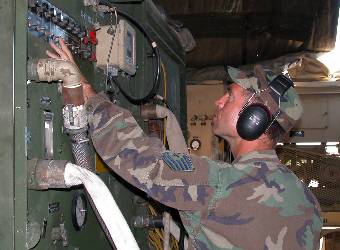 By Senior Airman Catharine Schmidt June 02, 2005
Operation Alaskan Road entails the construction of a 14.5-mile road on an island that is Alaska's only federally recognized Indian reservation. When completed, the road will connect the town of Metlakatla with a ferry boat dock on the north end of the island that will provide quick and easy access to Ketchikan, Alaska's fifth-largest city, across the bay. A joint force of reserve and active-duty component troops -- including Army, Navy, and Marine Corps -- is deployed here for the road-building project. On the Air Force side, six civil engineers provide critical support in camp every day, officials said. The Airmen said they take quality of life seriously. The area may be remote, but the civil engineers ensure that basic facilities at the camp are operational, making day-to-day life as comfortable as possible. Designed to accommodate about 220 people, the camp includes living quarters, latrines, a dining facility and other support buildings. To keep the camp functioning, the civil engineers provide all the plumbing, carpentry, power production and electrical support. "We handle all aspects of the base camp, from power to water," said Tech. Sgt. Brian Geske, who is deployed from the Kansas Air National Guard's 190th Civil Engineer Squadron. Water is critical, not just for drinking and cooking but for showers, toilets and general sanitation, and servicemembers may consume up to 7,000 gallons a day. The civil engineers use a reverse osmosis water purification unit for all the water at the camp. The unit purifies the water from a local stream and then pumps it into storage bladders. "( The unit ) is providing all the water in camp," Sergeant Geske said. "We also maintain the waste-water treatment facility. Everything is also powered by diesel generators." That generator power is critical since there is no outside source of electricity available. In the chilly Alaskan environment, power to heat the barracks is not merely a matter of comfort but a safety issue as well. A generator out of commission is an urgent problem, and the Airmen deal with such emergencies promptly, whatever the time of day. "We really get a chance to put our skills to use," Sergeant Geske said. When the camp opened for the season, the civil engineers put in long days to bring the camp from its winter "hibernation" to its current full-scale operation phase, which will last through September. With the heavy work completed, the Airmen are now concentrating on maintenance and upkeep. "This is a great learning opportunity," said Senior Airman Christopher Blackburn, deployed from the 36th CES at Andersen Air Force Base, Guam. "We're getting good experience here, while also helping out the ( Metlakatla Indian ) community. I'm also learning a little about the other services. I've gained a new respect for them." Operation Alaskan Road is the first deployment for many of the troops here, but for others, like Airman Blackburn, the remote location is nothing new. This is his third deployment. His first two were at forward-deployed locations in Southwest Asia, and he said he appreciates the change of pace, as well as the breathtaking Alaskan scenery. "Anytime people go on deployments, it's a new experience they should ( embrace )," Sergeant Geske said. "There is a lot of beauty here. A group of us went hiking, and it was fantastic. Getting involved in the local community in a new environment is what makes the experience enjoyable." While the Airmen are doing their part to keep the camp and the water purification unit running smoothly, other forces are getting their feet in the dirt -- literally -- on the road project. About 12 miles are under construction in various phases, with military teams clearing the land and then drilling, blasting, filling, compacting and installing culverts in preparation for final surfacing, which will be handled by the Federal Highway Administration. This seasonal project is in its eighth year, a continuing effort to make good on a 60-year-old promise by the Alaska Road Commission and the Army Corps of Engineers to the island's Metlakatla Indian community to build the road.
Public Affairs, contributed to this article.) Publish A Letter on SitNews Read Letters/Opinions Submit A Letter to the Editor
|
||
